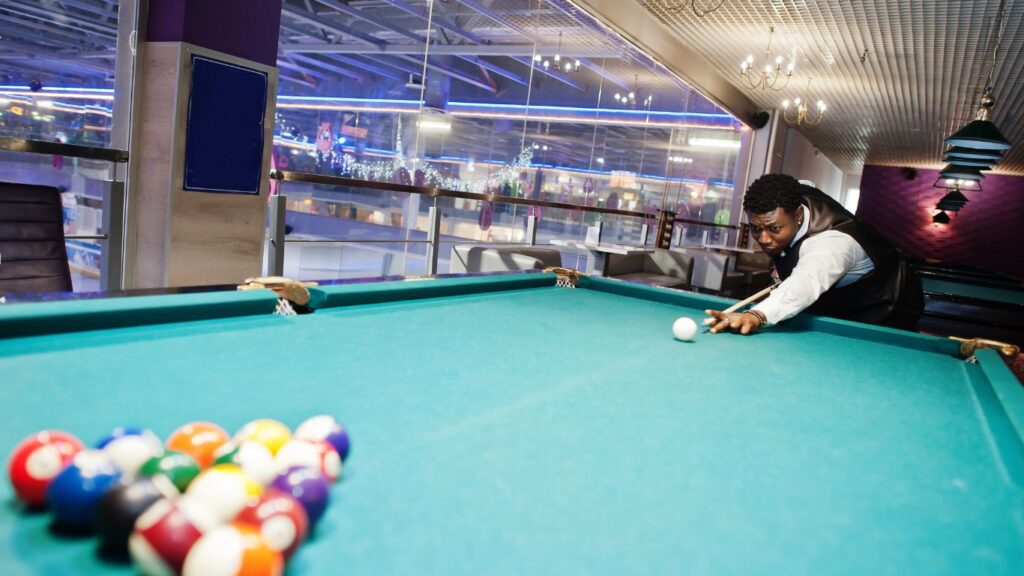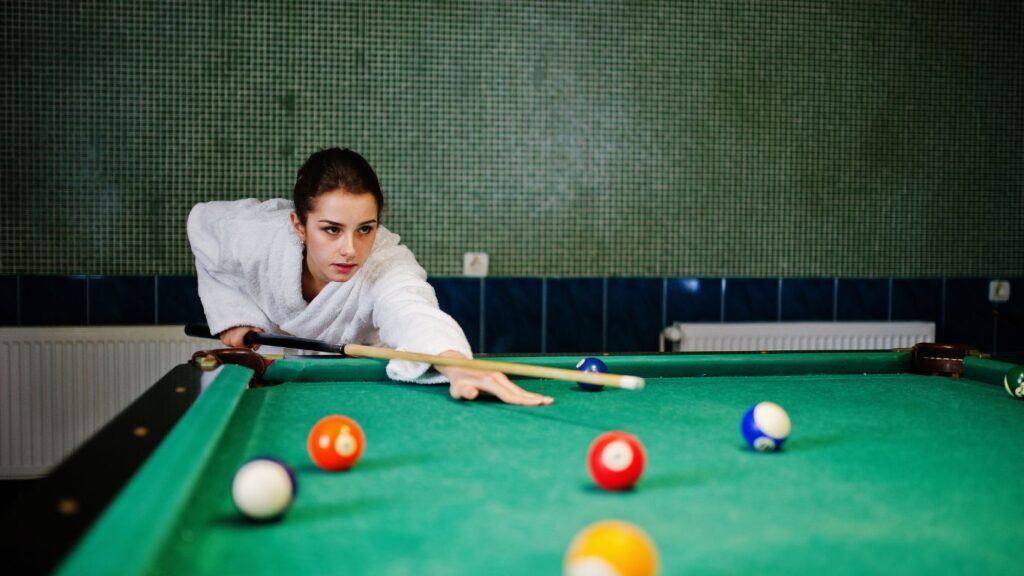The question of whether pool qualifies as a sport has been debated among enthusiasts and critics alike. To address this, we first need to define what constitutes a sport. According to widely accepted criteria, a sport is an activity that involves physical exertion and skill, played individually or in teams, under a set of rules, with the primary objective of winning. This definition encompasses activities requiring physical strength, agility, endurance, and strategy, often featuring organized leagues or tournaments.
But where does pool fit into this definition? Known for its strategic gameplay and precise movements, the pool includes eight-ball, nine-ball, and straight pool variations. It is played on a rectangular table with six pockets, using cues to strike coloured balls in a specific order into the pockets. Let’s delve deeper into whether a pool meets the criteria of a sport.
History of Pool as a Competitive Activity

Pool, also known as billiards, has a rich history dating back to the 15th century. Originating in Europe, it evolved from lawn games similar to croquet. Over the centuries, the pool developed into an indoor match, gaining popularity in the United States during the 20th century. Today, the pool is played recreationally and competitively worldwide, with a structured system of leagues, tournaments, and professional circuits.
Comparison to Traditional Sports Criteria
To determine if the pool is a sport, we can compare it to traditional sports using the following criteria:
- Physical Exertion: Pool requires precise and controlled movements, mainly when using the cue stick to strike the balls accurately. While it may not involve the same physical exertion as running or jumping, it demands substantial control over fine motor skills.
- Skill Level: The game demands a high level of skill, including hand-eye coordination, strategic thinking, and finesse. Players must calculate angles, control the cue ball’s speed, and execute complex shots, all of which require significant practice and expertise.
- Individual and Team Play: Pool can be played individually or in teams, allowing for a competitive structure. Like basketball, tennis, and football (soccer), it features individual matches and team events, making it versatile in its competitive formats.
- Rules and Regulations: The pool is governed by a strict set of rules, ensuring fair play and competition. These rules vary slightly depending on the variation in the way they are played, but they are standardized in official leagues and tournaments.
- Competitive Structure: The pool boasts an organized competitive structure, with local, national, and international tournaments. Professional organizations like the World Pool-Billiard Association (WPA) oversee these competitions, adding credibility to its status as a sport.
- Training and Conditioning: Many professional pool players undergo rigorous training and conditioning to maintain their performance. This includes practising various shots, developing strategies, and engaging in mental preparation, similar to athletes in other sports.
- Objective to Win: The primary objective in the pool is to win, with the outcome determined by the players’ performance. This competitive nature aligns with the fundamental essence of sports.
Arguments For and Against Pool as a Sport
Arguments For:

- Physical Exertion: Pool involves precise, controlled movements that require fine motor skills, hand-eye coordination, and physical endurance, especially during long matches.
- High Skill Level: The game demands strategic thinking, angle calculations, and finesse, akin to the skills required in traditional sports like golf or archery.
- Competitive Structure: The pool has a well-established competitive structure with organized leagues and tournaments at various levels, reinforcing its status as a sport.
- Rules and Fair Play: Governed by strict rules, the pool ensures fair play and competition, similar to other recognized sports.
- Professional Training: Top-level pool players engage in extensive training and conditioning, paralleling the dedication seen in other sports.
- Winning Objective: Like any sport, the primary goal in the pool is to win, with outcomes determined by the players’ performance.
Arguments Against:
- Lower Physical Exertion: Critics argue that pool sports do not involve the same physical exertion as basketball, soccer, or track and field sports, questioning its classification as a sport.
- Perception of Recreational Activity: Pool is often perceived as a recreational or social activity rather than a competitive sport, influencing public perception.
- Venue and Atmosphere: Pool is frequently played in casual settings like bars and pool halls, which may detract from its recognition as a formal sport.
FAQs

What is the origin of the pool?
Pool, also known as billiards, originated in Europe during the 15th century. It evolved from lawn games similar to croquet and eventually transitioned into an indoor table game. The game saw significant evolution and gained immense popularity in the United States during the 20th century.
Does the pool require physical fitness?
While the pool may not require the same degree of physical fitness as sports like basketball or soccer, it does demand physical control, fine motor skills, and endurance, especially during long matches.
How is a pool different from billiards?
“Pool” often refers to various cue sports played on a table with pockets, such as eight-ball, nine-ball, and straight pool. “Billiards” is a broader term that includes all cue sports, but it generally refers to carom billiards games played on tables without pockets.
Are there professional pool players?
Yes, professional pool players compete in national and international tournaments. Like athletes in other sports, they undergo rigorous training and conditioning to maintain high performance levels.
What organizations govern pool competitions?
Organizations like the World Pool-Billiard Association (WPA) and the Billiard Congress of America (BCA) govern pool competitions, ensuring standardized rules and fair play in leagues and tournaments worldwide.
Is pool considered a sport or a recreational activity?
The classification of swimming as a sport or a recreational activity is debated. Proponents argue that the pool’s skill, strategy, physical control, and competitive structure qualify it as a sport. Critics point to its lower physical exertion and recreational perception as reasons against its classification as a sport.
Conclusion
Pool meets many of the criteria commonly used to define a sport. It requires physical exertion, a high skill level, and strategic thinking. It is played individually and in teams, governed by a strict set of rules, and features a competitive structure with organized leagues and tournaments. Moreover, professional pool players undergo rigorous training and conditioning, aligning with the preparation seen in other recognized sports. While some may argue that pool lacks the physical intensity of traditional sports, its combination of skill, strategy, and competition underscores its legitimacy as a sport. As such, the pool deserves recognition as a beloved recreational activity and a competitive sport that mentally and physically challenges its players.









